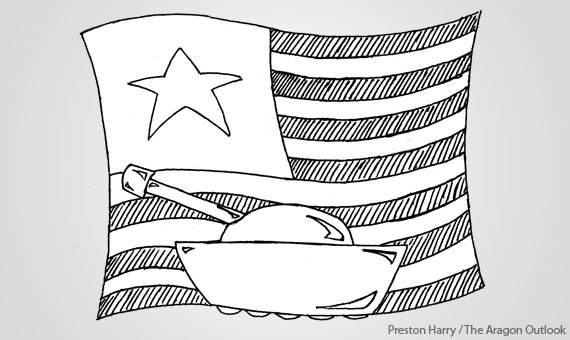

In the midst of a tumultuous election season, several issues are expected to surface. One issue is the United States government’s defense spending and whether or not this spending should be curbed or boosted. President Obama contends that the defense budget remain the same, while Republican rival Mitt Romney insists that the budget should be increased.
According to a statement released by the Stockholm International Peace Research Institution (SIPRI), the United States was the biggest military spender in 2011, with $711 billion allocated towards the military budget. This makes up 41 percent of all international spending—a significant proportion dedicated to a single nation. The United States retains a tremendous GDP, and while it ranks first in overall spending, it only ranks eleventh for the percent of GDP put towards the military budget.
Military spending only accounts for about 20 percent of the entire budget, a seemingly surprising number despite the daunting price tag. Most defense spending is dedicated towards the similarly named Department of Defense and covers a variety of costs ranging from waging war to paying veteran pensions. Many people can sympathize with somewhat generous military benefits and pensions, while some condemn the high cost of war and the United States’ dramatic role in world affairs.
But the question remains, how much should the United States spend? Among Aragon students, many think the US should decrease military spending. Sophomore Masao Dahlgren noted, “It should definitely be decreased by a bit, not by much. Military spending should be shifted elsewhere. Our policies are outdated and money is wasted on bureaucracy.” Senior Alvin Ho added, “40 percent is too disproportionate for one country to spend. I know we’re important and beneficial [to foreign affairs], it’s just that we shouldn’t be pulling the world.”
But where could the government shift any funds? Senior Rachel Van Heteran suggested, “Everyone always complains how expensive social programs like Medicare are, maybe we could shift it there.” In light of the recent political debates over Medicare and Medicaid reform, that proposition seems like a common thought. Modern World History teacher Ron Berggren agreed, saying, “It should go to social programs and infrastructure, and just taking care of people in this country. Things that help business, jobs, and the economy.”
Senior George Medan added, “[We should] balance the [federal] budget, get rid of debt; it’s a no brainer. Make people want to do business.”
Following the recent release of an anti-Islamic film, protests erupted across the Middle East, during which several American embassies were besieged. In one particular instance, members of an Islamist militia assaulted the American embassy in Libya, killing the ambassador and several others. The resulting anti-American sentiments were reminiscent of the bombing of the USS Cole in 2000 and the terrorist attacks on September 11, 2001.
When asked if he’s worried about possible terrorist threats raised by antiAmerican sentiments, Berggren noted that, despite potential budget cuts, “I think we’re safer as a country just because of the raised awareness. Hopefully intelligence agencies have been working together to share information.”
Dahlgren disagreed, stating, “[We’re] more at risk. We keep breeding hate, which just turns into death.”
Naturally, most Americans tend to feel a sense of pride in the nation’s military status. Regarding America’s pride in its armed forces, Medan stated, “Defense is a necessity. But I don’t think we need to be the ‘best’ [country]— it’s prideful enough to be able to defend ourselves.” Berggren tentatively agreed, adding, “You must have a way to defend your country. Should it be the absolute best? I don’t know. We are now, and that would be good to maintain.”
The discrepancy between two definitions of defense has been brought to the spotlight in recent months with two conflicting ideologies. During his first presidential campaign, President Obama planned to “reintroduce” the United States to the world and take a gentler approach to world affairs than the previous Bush administration. He managed to partially fulfill this goal with the withdrawal in Iraq and drawdown in Afghanistan while strengthening national security. Governor Romney, on the other hand, embraced Bush’s “neo-conservative” approach to foreign policy. In essence, neo-conservatives believe that the United States can justifiably look out for the country’s interests abroad, and support the use of military force if necessary.
As it stands, the two nations the United States invaded, Afghanistan and Iraq, are both extremely factionalized nations, and are notoriously difficult to govern. It’s predicted that without American aid, Iraq will eventually collapse into civil war. Likewise, Afghanistan is still struggling to defend itself from Taliban insurgents, the remnants of the former dictatorial regime.
Throughout American history, the country has had a stake in foreign affairs. Regardless of who the next president is, or what he supports, it is likely that the United States will not hesitate to involve itself in foreign affairs. After all, Van Heteran added wryly, “It’s the American way.”




